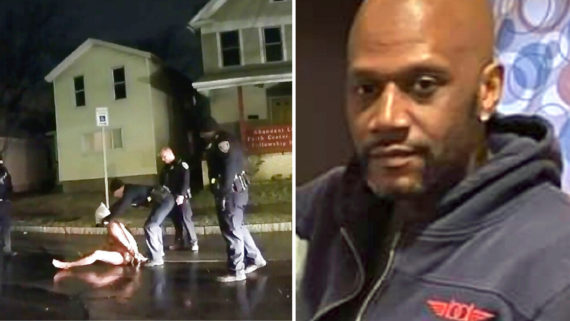 Daniel Prude, 41, apparently stopped breathing as police in Rochester, N.Y. were restraining him in March 2020 and died when he was taken off life support a week later. Photo provided by Roth and Roth LLP.
Daniel Prude, 41, apparently stopped breathing as police in Rochester, N.Y. were restraining him in March 2020 and died when he was taken off life support a week later. Photo provided by Roth and Roth LLP.
(9-18-20) Most of the media attention about Daniel Prude’s death in Rochester has been focused on the police response. What hasn’t been answered is why did a treatment center discharge him hours earlier? Cheryl Roberts, a former judge and executive director of the Greenburger Center for Social and Criminal Justice, asks that question and suggests in a recent editorial that America’s health-care system may be ” just as racist” as the criminal justice system. I look forward to reading your thoughts on my Facebook page.
Hard lessons from Daniel Prude’s death: The Rochester tragedy didn’t need to happen
When it comes to mental health care, the picture is even more disturbing and confounding. While only one in three African-Americans receive the mental health care they need, research also shows that Blacks are more often misdiagnosed with psychotic disorders than Euro-Americans, and Black men are three to five times more likely to be diagnosed with schizophrenia than white men. It is unclear why, but some researchers believe this could be attributable to cultural bias.
Others suggest it is a contemporary version of “racist thinking” dating to the 18th century, when “[s]lave owners and their apologist physicians invented psychiatric ‘disorders’ such as ‘draeptomania’ to explain the urge to run away.” One can wonder if “excited delirium,” a term first appearing in a 1849 American Journal of Insanity article and used to describe Prude’s condition, as well as justification for the deaths of many others killed by police, is just another version of “draeptomania.”
Yet when it comes to deaths of people in mental health crisis by police, the rote response is a call for more Crisis Intervention Team (CIT) training, even though a 2019 American Academy of Psychiatry and Law Journal article found “[t]here is little evidence in the peer-reviewed literature, however, that shows CIT’s benefits on objective measures of arrests, officer injury, citizen injury, or use of force.” It does, however, seem to improve “officer satisfaction and self-perception of a reduction in use of force” and may lead to more jail diversion.
To be sure, police need more training and accountability, but they also need to not be our first responders to mental health crises. People like Daniel Prude deserve full access to unbiased mental health treatment. We don’t know precisely what type of care he received, but the odds are, he didn’t get what he needed.
He may have needed mandated community treatment, through Kendra’s Law, which allows judges to place those with serious mental illness into mandated and monitored treatment for up to one year if they have a history of multiple arrests, hospitalizations and an inability to comply with treatment.
He may have needed stable supportive housing, which is documented to result in fewer ambulance rides, days in substance use residential treatment and psychiatric hospitalizations, and reduced recidivism rates, including the number of felony convictions.
What he didn’t need was to die at the hands of police.
Reprinted with the author’s permission.
About the author: Cheryl Roberts: In addition to serving as Executive Director of the Greenburger Center, Ms. Roberts is the Corporation Counsel for the City of Hudson, New York and a licensed bond agent in New York State. Previously in her career, Roberts was a town judge from Columbia County, New York and served as a counsel to committees in both the US House of Representatives and the US Senate.

Read more: You can read blog here about the Greenburger Center and its founder, Francis Greenburger, whose adult son was arrested during a psychotic break.



